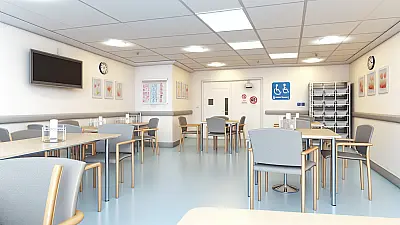EL MONTE, CA - State inspectors cited The Gardens of El Monte for multiple care failures after a resident with kidney disease and swallowing difficulties was hospitalized with life-threatening dehydration and dangerously high sodium levels.

Critical Hydration Management Failures
The most serious violation occurred when facility staff failed to ensure adequate fluid intake for a resident with multiple risk factors for dehydration. The resident required between 1,950 to 2,040 milliliters of fluid daily according to the facility's registered dietitian assessment, but records showed the resident consistently received far less than this requirement over a 16-day period.
Daily fluid intake records revealed alarming deficiencies. On several days, the resident consumed as little as 120 milliliters - roughly half a cup of liquid. Even on better days, intake rarely exceeded 930 milliliters, falling well short of the minimum 1,950 milliliters needed. The resident's care plan specifically identified the risk for fluid-electrolyte imbalance and required staff to monitor intake and output, yet no physician's order for this monitoring was ever obtained.
The consequences became evident on June 1, when the resident experienced an altered level of consciousness with a dangerously slow heart rate of 28 beats per minute and oxygen saturation of just 72 percent. Emergency medical services transported the resident to a local hospital, where blood tests revealed a sodium level of 169 millimoles per liter - significantly above the normal range of 135-145.
Medical Significance of Dehydration in Vulnerable Populations
Proper hydration is critical for nursing home residents, particularly those with kidney disease and swallowing difficulties. When fluid intake falls below physiological needs, the body's sodium concentration rises, leading to hypernatremia. This condition affects cellular function throughout the body and can cause neurological complications including altered consciousness, confusion, and in severe cases, coma.
The resident's existing chronic kidney disease made adequate hydration even more crucial. Damaged kidneys have reduced ability to concentrate urine and retain water, making these patients particularly vulnerable to dehydration. When combined with swallowing difficulties requiring thickened liquids, the risk compounds significantly as residents may avoid drinking due to texture preferences or physical challenges.
Hypernatremia can trigger a cascade of medical complications. Dehydration worsens kidney function, potentially leading to acute kidney injury requiring intensive medical intervention. The condition also increases infection risk, as concentrated urine provides an ideal environment for bacterial growth in the urinary tract.
Communication and Monitoring Breakdown
The inspection revealed systemic failures in communication between care team members. The registered dietitian stated that nursing staff never reported the resident's inadequate fluid intake despite daily documentation showing consistent deficiencies. Licensed vocational nurses interviewed were unaware of the resident's history of elevated sodium levels or specific daily fluid requirements.
One certified nursing assistant reported that the resident "required a lot of encouragement to drink fluids" and was "unable to drink fluids by himself because Resident 1 did not have balance of Resident 1's hands." However, this critical information was never communicated to licensed nurses or the physician, representing a significant breakdown in the care team's communication chain.
The facility's care plan required monitoring intake and output, yet staff failed to obtain the necessary physician's order to implement this intervention. Licensed nurses acknowledged they should have contacted the resident's physician to secure proper monitoring orders but failed to do so.
Industry Standards and Required Protocols
Nursing home regulations require facilities to maintain each resident's nutritional and hydration status. For residents with identified risks like kidney disease and swallowing disorders, this typically involves establishing specific fluid targets, implementing monitoring protocols, and maintaining clear communication pathways between all care team members.
Standard protocols would have required daily assessment of fluid intake against established targets, immediate reporting of deficiencies to licensed nurses, and prompt physician notification when intake consistently falls below requirements. The facility's own policies required immediate reporting of any changes in resident condition to nursing supervisors and the resident's physician.
Additional Issues Identified
Inspectors documented additional concerns beyond the hydration failure. The facility lacked proper physician orders for required monitoring interventions outlined in the care plan. Staff education appeared inadequate, as multiple team members were unaware of the resident's specific medical risks and fluid requirements. Documentation systems failed to trigger appropriate responses when daily fluid intake consistently fell below established minimums.
The inspection findings highlight the critical importance of coordinated care for nursing home residents with complex medical conditions. Proper hydration management requires systematic monitoring, clear communication protocols, and prompt medical intervention when deficiencies occur.
Full Inspection Report
The details above represent a summary of key findings. View the complete inspection report for The Gardens of El Monte from 2024-06-17 including all violations, facility responses, and corrective action plans.
💬 Join the Discussion
Comments are moderated. Please keep discussions respectful and relevant to nursing home care quality.